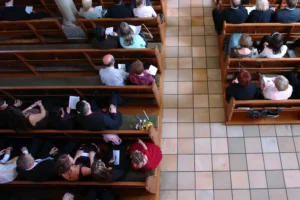Leah threw her hands up in exasperation.
“I don’t know what body part I am,” she said, referencing 1 Corinthians 12. “I feel like I’m the tonsils or the appendix. Something you don’t really need.”
The six people sitting around the table — all in their 20s and early 30s, all single — nodded.
Our dinner conversation had taken an odd turn from amusing workday anecdotes to our feelings about church.
Leah, 30, who was incinerated by her last church, described what drew her to the cult-like legalism she experienced there. “I decided I was going to make myself indispensable,” she said. “I was there every night of the week. I got involved in everything.”
That strategy did not end well. “When my husband and I started having problems and eventually divorced, I became an outcast,” she said. “The pastor lived on my street but never talked to me again.”
Jake, 29, nodded. “I haven’t really been part of a church for three years. I just don’t fit anywhere.” This from an outgoing guy who grew up attending church and worked for a Christian organization.
The other stories around the table were similar. The pastor’s daughter looking for authentic community where she can be open about her struggle with an eating disorder. The well-spoken young professional who can’t find a place to exercise his gift of teaching. The 28-year-old bachelor who wonders if someday soon people will cast a suspicious eye on him for working in children’s ministry. And, me, in my early 30s, having fully expected to have had a family by now, and wondering what it looks like to serve the church — like this.
Yet despite the longing to fit in, there was deep camaraderie among us over our struggle for belonging in the church. Beneath the solidarity, was longing. Longing for a spiritual oasis where people truly care about our needs, help us sort out our confusion and reassure us that we are not alone in our fears.
Getting There
The conversation that night stuck with me. Partially because this was a group of young adults that from the average evangelical perspective would be considered the cream of the crop.
Most of us attended church from infancy and were reared by godly parents who taught us to follow biblical principles. We had all been active in our churches and served in vital ministries. And yet even we felt awkward about engaging with the sacred entity that Christ established as His physical presence on earth.
A couple of months ago my pastor asked everyone in the congregation who was between ages 18 and 30 to stand. About one-sixth of the congregation rose. “I have to confess,” our 40-something pastor said, “I don’t know how to reach your generation. I don’t understand you. You will have to be the ones to reach your generation.”
I understood the pastor was being very honest, but his words weighed heavily on my spirit. How? I thought. How can I reach my generation when you are essentially telling me I’m on my own? My generation already struggles to get on board with a spiritual organization that seems incongruent with many of our values — authenticity, relevance, community.
When it comes to what motivates me to brave the pews, it’s the comfort of knowing someone will know my name and save me a seat. I desire to belong and be valued.
Unfortunately, the message I’ve sometimes received from the church is that there is not an integral role for me to play. That my best ministry is to simply show up, and if I’m extra ambitious, evangelize my peers.
Instead of “I don’t understand you,” I longed for my pastor to say, “I want to know you. I may not understand you now, but I suspect that if I got to know you, I would discover that you have something incredibly important to contribute.”
Something I’ve learned is that the church is not always going to be effective at reaching out to me. And yet, over the last decade, I have had an overwhelmingly fulfilling relationship with my church. Here are four ways to plug in:
1. Remember God’s purpose for ALL believers within the church. Those who truly desire to follow Christ recognize that the church is something special. Deep down we know that the very thing that seems inhospitable to us is the solution for the isolation and restlessness we feel. There is undeniable beauty in the idea of a group of humans demonstrating the unity of the Godhead and doing His work on earth.
If the church is Christ’s bride, it must be something remarkable. If He loved the church enough to give His life for her, she must be far more valuable than we comprehend. And when we discover what that is all about, we will be caught up in something wonderful.
The first Christian churches were characterized by intense community, selfless giving and overflowing love. People of all ages and stages in life came together to revel in the power of the gospel and worship God. It didn’t seem to matter if you were on your own. In fact, they seemed to care for you more if you were a widow or orphan.
2. Become involved in the life of the church. A few years ago when I felt disconnected attending Sunday morning services, I signed up to teach fifth grade Sunday school every week. Something remarkable happened. Twenty kids and their parents began to recognize me at church and come over for hugs. Once the children’s ministry staff learned that I had 10 years of experience teaching children, they sought me out for my ideas and expertise.
Getting to know children and families in my church made all the difference. Suddenly I wasn’t alone in Sunday morning service. I had little friends waving to me, smiling and telling me I looked pretty.
3. Start something. A lot of young adults complain that their church offers nothing for people in their life stage. This was the case for me and some of my friends. So at the beginning of this year, we decided to start a 20-something Bible study. Obviously the need was great. The first day we announced the group, 30 people signed up! [Note: Most of you know I also ended up falling in love with and marrying my co-leader.]
Around the same time, we began a Facebook group and organized a monthly get together. Sometimes we met at someone’s house for lunch after church. Other times we went bowling or out to a movie. A little organization provided great community time and an opportunity to make new friends.
4. Get to know your pastor. Pastors struggle to balance ministry to the senior saints of the church, families and singles. By spending time getting to know your pastor, you give him the opportunity to understand your needs.
Last year, I made an effort to talk to my pastor almost every week after church. We graduated from the same small Bible college, so that gave us some common ground. Each week I would tell him something I liked about the sermon or share a story about my kids’ Sunday school class. Soon he knew my name and would approach me and ask how I was doing.
When I became engaged to Kevin earlier this year, my pastor told me he had been praying for a godly spouse for me. This meant a lot, since I go to a church with 1,200 members. Most pastors want to get to know the people in their churches. But they may need you to take the first step.
Loving Your Church
Like Leah, our generation is looking for a cause worth investing our whole lives in. Twenty-somethings have a lot to offer. Generations X and Y are deeply spiritual, concerned about their neighbors and willing to take big risks. We resonate with Christ’s challenge that a man “take up his cross and follow me.” That is passion that is well-spent within the church.
When we plug into our congregations, we can reap the full benefit of what the Body of Christ was intended to be. The truth is, the church needs us as much as we need it. We must discover what body parts we are and how we can help the church take motion. Then we can feel more like hands than tonsils.
Copyright 2009 Suzanne Hadley Gosselin. All rights reserved.












